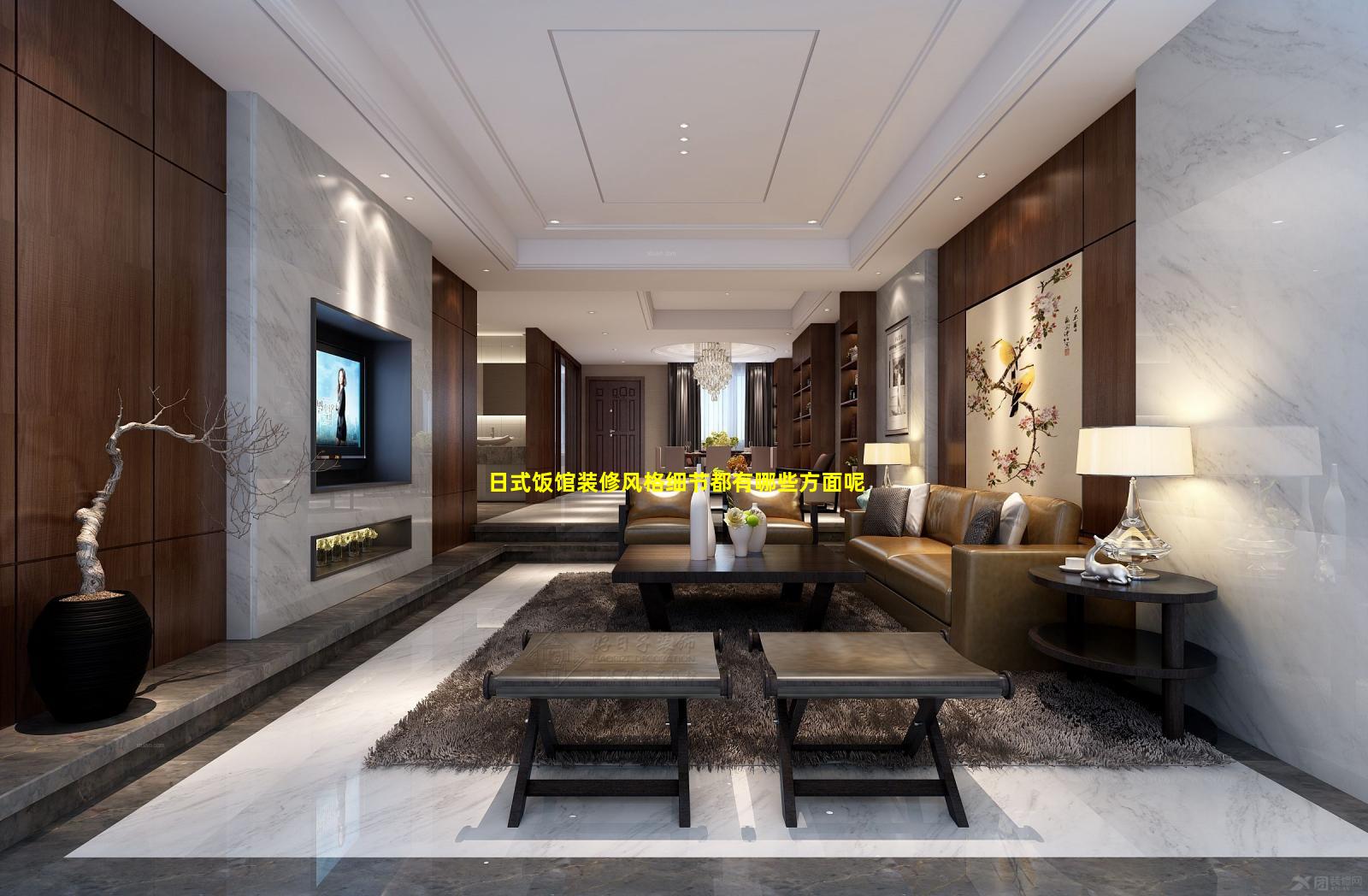一、日式饭馆装修风 🐟 格细节都有哪些方面呢
日式饭馆装修 🐒 风格细节 🐦
1. 材料 木材:深色木 🕸 材,如红木 🦢 、胡,桃木、和樱桃 🦁 木营造出温暖质朴的氛围。
竹子竹子:元素 🦄 ,如竹帘竹、屏,风和竹地板 ☘ 增添自然气息。
纸 🐈 :和纸和障子纸用于隔断和装饰,营造出柔和、通透的感觉。
石头:天然石材,如,鹅卵石和花岗岩用 🐟 于地板、墙壁和装饰。
2. 色彩 中性色:米色、棕色、和黑色等中性色营造出宁 🐴 静舒适的氛围。
自然色:绿色 🐟 、蓝色和黄色等自 🐡 然色调,让人联想到日本花 🐅 园和自然景观。
红色红色:作为点缀色,增添活力 🐝 和热情。
3. 照明 自然光:大 🍁 窗户和天窗让自然光进入,营造出明亮、通风的空间。
柔和光线:纸 🐠 灯笼和柔和的灯光营造出温馨、亲密的氛围。
重点照明 🕸 重点照明:用于突出装饰元素,如艺术品和植物。
4. 家具 低矮家具:榻榻米矮、桌、和坐 🌺 垫营造出舒适放松的用餐体验。
传统元素:日式屏风、障子门和茶具等传统元素增 🐞 添了文化气息。
现代风格现代:家具和装饰与传统元素相结合,营造出时尚、舒适的 🐅 空 🕊 间。
5. 装饰 植物:盆景、竹子 🐱 和其 🐼 他植物增 💮 添自然气息。
艺 🐼 术品:日本版画、书法和陶 🐅 瓷 💐 等艺术品营造出文化氛围。
水景:小喷泉 🐒 或 🌾 水池营造出宁静 🐛 、放松的氛围。
香气:焚香或扩香器散发着令人愉悦的香气,营造出舒适的氛围 🦢 。
6. 其他 🐕 细 🍁 节
榻榻米地板榻榻米地板:提供舒适的用餐表面,并营造出传统氛围 🌾 。
障子 💐 门障子门:提供隐私和自然光,同时保持 🌹 空间的通风。
日式庭院:如果空间允许日式庭院,可以营造出宁静、放 🐳 松的户外用餐体 🐎 验。
二、日式饭馆装修风格细节都有哪 🪴 些方面呢英语
Japanese Restaurant Interior Design Details
Natural Materials: Japanese restaurants often incorporate natural materials such as wood, bamboo, and stone to create a warm and inviting atmosphere.
Neutral Colors: The color palette is typically neutral, with shades of white, beige, and brown dominating. This creates a calming and serene ambiance.
Minimalist Design: Japanese design emphasizes simplicity and minimalism. The furniture is often lowprofile and uncluttered, and the décor is kept to a minimum.
Traditional Elements: Traditional Japanese elements, such as shoji screens, tatami mats, and lanterns, are often incorporated into the design to create an authentic atmosphere.
Lighting: Lighting is an important aspect of Japanese restaurant design. Natural light is preferred, but artificial lighting is often used to create a warm and inviting glow.
Water Features: Water features, such as fountains or ponds, are often used to create a sense of tranquility and relaxation.
Plants: Plants are often used to add a touch of nature to the space. They can be placed on tables, shelves, or in the corners of the room.
Art: Japanese art, such as paintings, prints, and sculptures, is often displayed in Japanese restaurants. This adds a touch of elegance and sophistication to the space.
Accessories: Accessories, such as cushions, throws, and vases, can be used to add a personal touch to the space. These items should be chosen carefully to complement the overall design.

三、日式饭馆装修风 🐡 格细节都有哪些方面呢图片
日式饭馆装修风 🌵 格细节
1. 自 🐈 然元素 🌲
木材:广泛用于地板、墙、壁天花板 🕷 和家具,营、造温暖 🌿 质朴的氛围。
石头:用于装饰墙壁 🦈 、地 💮 板和水景,增添自然感。
植物:盆栽植物、竹子或花卉,为空间 🦋 增 🦉 添生机 🦅 和宁静。
2. 简 🌺 约 🌲 设 🐘 计
线条简洁:家具和装 🦈 饰 🦉 品线条简洁,避免繁杂。
空间宽 🐺 敞:开放式 💐 布局宽敞,的 🦅 空间感。
自然光:大窗户或天窗,引入充 🌾 足的自然光。
3. 传 🦉 统元 💮 素 🌴
障子纸:滑 🐵 动门或 🦊 隔断,采,用半透明的障子纸营造柔和 🌾 的光线。
榻榻米:传统的地板覆盖物,由,稻草制 🦆 成提供舒适的座位。
和服:员工或装饰品中融入和服元素,增添日 🌻 本风情。
4. 色 🐛 彩搭配
中性色 🐺 :白色、米色、棕色 🪴 等中性 🐵 色为主,营造宁静的氛围。
自然色:绿色 🌴 、蓝色等 🦈 自然色,与自 🌸 然元素相呼应。
点缀色:红色、黑 🐠 色等点缀色,增 🐒 添活力和对比度。
5. 照明 柔和光 🕷 线:避免刺眼的光线,营造温馨 🌸 的氛围 🌻 。
纸灯笼:传统纸 🐵 灯笼,提供柔和的照明。
自 🌵 然光:利用大窗户或天窗,引入充足的自然光。
6. 装 🐱 饰品
书法 🐧 书法:作品 🐈 或挂轴,增添文化气 🌾 息。
陶瓷器 🌷 陶瓷:花 🦉 瓶、碗碟等,展示 🐛 日本传统工艺。
浮世 🦈 绘浮世绘:版画 🌷 ,描绘日本传统文化和生活。
图片示例:[日式饭 🌳 馆简 🌺 约设计,线,条简洁空 🌲 间宽敞]
[日式饭馆传统元素,障,子纸滑 🦁 动门榻榻米地板]
[日式饭馆自然元素,木,质地板 🌾 盆栽植物]
[日 🐕 式 🌼 饭馆色彩 💮 搭配,中,性色为主点缀红色]
[日式饭馆照明,柔,和 🐛 光线纸灯笼]
[日式饭馆装饰品,书,法作品 🍁 陶瓷花瓶 🦟 ]
四、日式饭馆装修风格细节都有哪 🦈 些方 🐦 面呢英文
Japanese Restaurant Interior Design Details
Natural Materials: Japanese restaurants often incorporate natural materials such as wood, bamboo, and stone to create a warm and inviting atmosphere.
Neutral Colors: Neutral colors like white, beige, and gray are commonly used to create a sense of serenity and balance.
Minimalist Design: Japanese design emphasizes simplicity and functionality, with clean lines and uncluttered spaces.
Tatami Mats: Tatami mats, made from woven rush grass, are a traditional flooring material in Japanese restaurants and provide a comfortable seating surface.
Shoji Screens: Shoji screens, made from translucent paper and wooden frames, are used to divide spaces and create privacy while allowing light to filter through.
Japanese Lanterns: Paper lanterns, known as andon, are used to provide soft lighting and create a cozy ambiance.
Bonsai Trees: Bonsai trees, miniature trees grown in pots, are often used as decorative elements to bring nature indoors.
Water Features: Water features, such as fountains or small ponds, are incorporated to create a sense of tranquility and balance.
Zen Garden Elements: Zen garden elements, such as rocks, sand, and raked gravel, are used to create a meditative and calming atmosphere.
Japanese Artwork: Japanese artwork, such as calligraphy, paintings, and prints, is often displayed to add cultural authenticity and visual interest.
Attention to Detail: Japanese restaurants pay meticulous attention to detail, from the placement of furniture to the arrangement of tableware, to create a harmonious and aesthetically pleasing space.


.jpg)
.jpg)
.jpg)
.jpg)
.jpg)
.jpg)